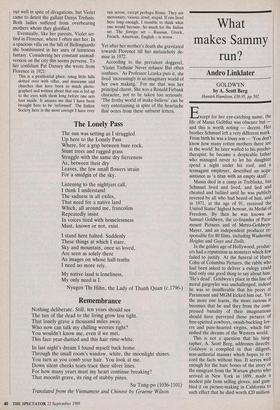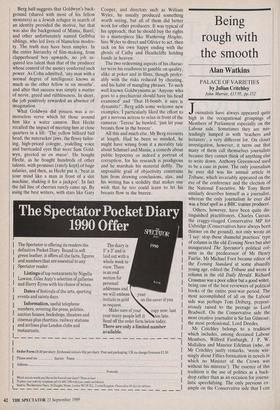What makes Sammy run?
Andro Linklater
GOLDWYN by A. Scott Berg
Hamish Hamilton, £16.95, pp.582
Except for her eye-catching name, the life of Mania Gelbfisz was obscure but — and this is worth noting — decent. Her brother Schmuel left a very different mark. From birth he was a lousy son — 'You don't know how many rotten mothers there are in the world' he later wailed to his psycho- therapist; he became a despicable father who managed never to let his daughter spend a night under his roof, and a termagant employer, described an acqu- aintance as 'a titan with an empty skull'. Mania died in a camp in Treblinka, but Schmuel lived and lived, and lied and cheated and bullied until he was publicly revered by all who had heard of him, and in 1971, at the age of 91, received the United States' highest honour, its Medal of Freedom. By then he was known as Samuel Goldwyn, the co-founder of Para- mount Pictures and of Metro-Goldwyn- Mayer, and an independent producer re- sponsible for 80 films, including Wuthering Heights and Guys and Dolls.
In the golden age of Hollywood, produc- ers had a reputation as monsters which few failed to justify. At the funeral of HarrY Cohn of Columbia Pictures, the rabbi who had been asked to deliver a eulogy could find only one good thing to say about him: 'He's dead'. Goldwyn's place in this line of moral gargoyles was unchallenged, indeed he was so insufferable that his peers at Paramount and MGM kicked him out. Yet the more one learns, the more curious it becomes that he and they from the com- pressed banality of their imaginations should have purveyed those pictures of free-spirited cowboys, swash-buckling lov- ers and pure-hearted virgins, which fur- nished the dreams of the Western world.
This is not a question that his biog- rapher, A. Scott Berg, addresses directly. Goldwyn is compiled in that diligent, non-authorial manner which hopes to re- cord the facts without bias. It serves well enough for the bare bones of the story of the emigrant from the Warsaw ghetto who arrived in New York in 1899, made a modest pile from selling gloves, and gam- bled it on picture-making in California to such effect that he died worth £20 million. Berg half-suggests that Goldwyn's back- ground (shared with most of his fellow monsters) as a Jewish refugee in search of an identity provided the motive, but that was also the background of Mania, Barel, and other unfortunately named Gelbfisz siblings, who led lives of blameless modes- ty. The truth may have been simpler. In the entire hierarchy of film-making, from clapperboard boy upwards, no job re- quired less talent than that of the producer whose control of the money conferred such power. As Cohn admitted, 'any man with a normal degree of intelligence knows as much as the other fellow in six months', and after that success was simply a matter of nerve, greed and ruthlessness. In short, the job positively rewarded an absence of imagination.
What Goldwyn did possess was a re- morseless verve which hit those around him like a water cannon. Ben Hecht recalled the impact of meeting him at close quarters in a lift: 'The yellow billiard ball head, the nutcracker jaws, the flossy tailor- ing, high-priced cologne, yodelling voice and barricaded eyes that were Sam Gold- wyn, greeted us en masse'. He bought Hecht, as he bought hundreds of other talents, with promises (rarely kept) of huge salaries, and then, as Hecht put it, 'beat at your mind like a man in front of a slot machine, shaking it for a jackpot'. In fact the full line of cherries rarely came up. By using the best writers, with stars like Gary Cooper, and directors such as William Wyler, he usually produced something worth seeing, but all of them did better work for other producers. It was typical of his approach, that he should buy the rights to a masterpiece like Wuthering Heights, hire Wyler to direct and Olivier to act, then tack on his own happy ending with the ghosts of Cathy and Heathcliffe holding hands in heaven.
The two redeeming aspects of his charac- ter were his readiness to gamble on quality, alike at poker and in films, though prefer- ably with the risks reduced by cheating, and his habit of mangling phrases. To such well-known Goldwynisms as 'Anyone who goes to a psychiatrist should have his head examined' and 'That H-bomb, it sure is dynamite!', Berg adds some welcome new examples. I particularly liked the effort to get a nervous actress to relax in front of the cameras: 'Teresa' he bawled, 'just let your breasts flow in the breeze'.
All this and much else, Mr Berg recounts at length. Had he been so minded, he might have wrung from it a morality tale about Schmuel and Mania, a comedy about public hypocrisy or indeed a portrait of corruption, for his research is prodigious and he marshals his material deftly. The impossible grail of objectivity constrains him from drawing conclusions, alas, and his writing has a stolidity that makes one wish that he too could learn to let his breasts flow in the breeze.



























































 Previous page
Previous page